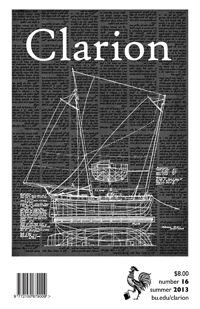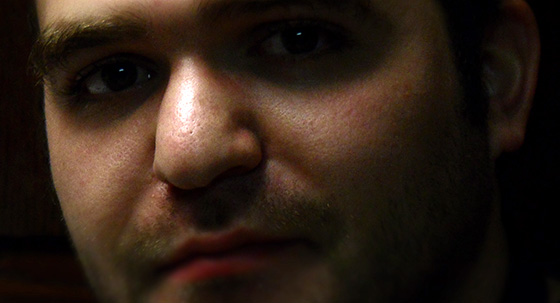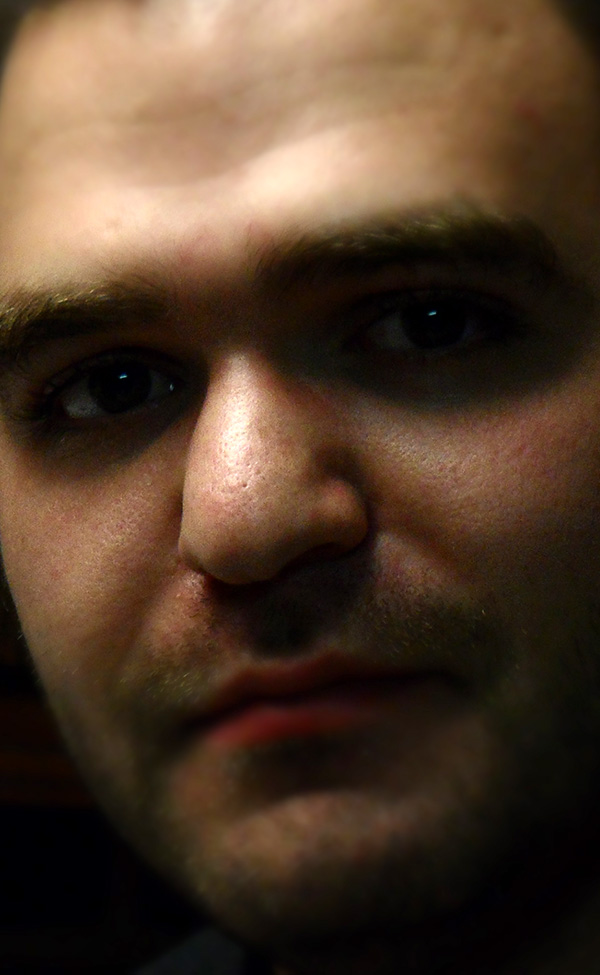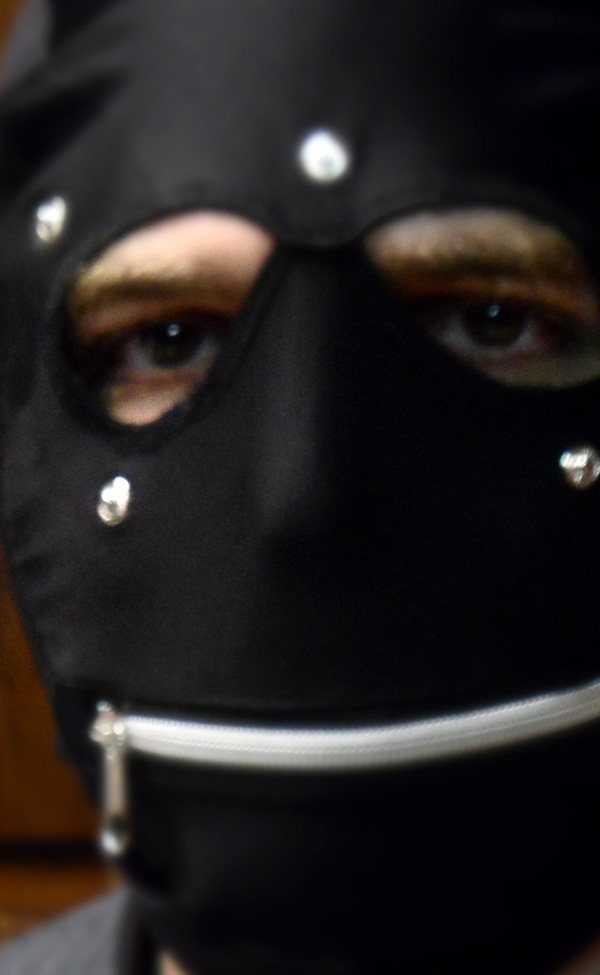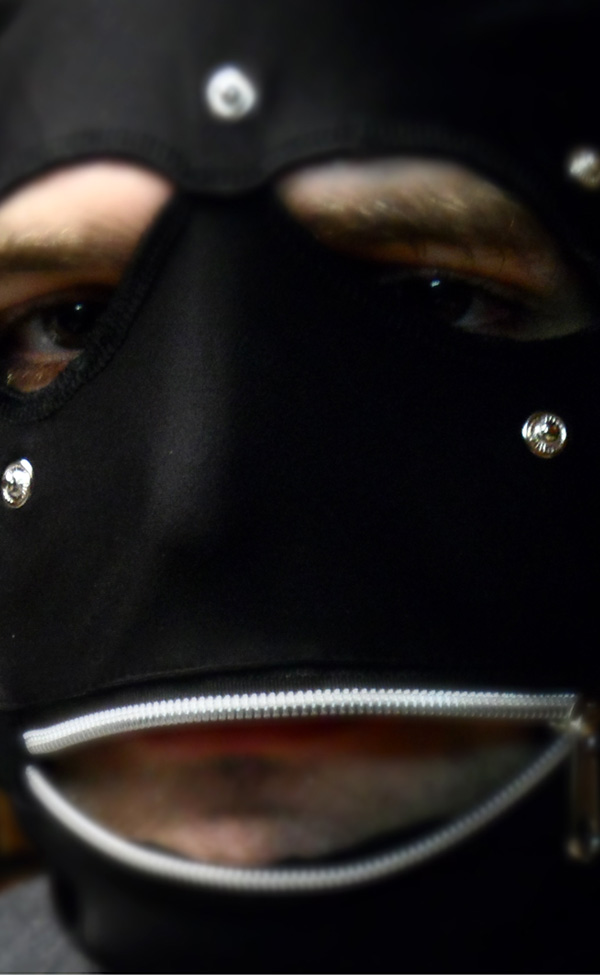|
an interview by Sandy SooHoo with Thomas Simmons:
SS: Maybe you could tell me a little bit about your experience at Boston University and how it did or didn’t shape your voice as a writer? TS: My official stance on my experiences at college and how they helped me become a better writer is that the school taught me how I did not want to write. It’s true that BU did a wonderful job in strengthening my grammar-chops, there’s no doubt about that, but after that I didn’t derive much, if any inspiration from the classroom. Whenever I took a class on writing it seemed that my professors wanted to me to learn how to write mediocrely instead of write to my potential. So I’d sit in classes and watch what the professors were doing and think to myself, “Okay. This is exactly what I don’t want to do.” It was outside of the classroom during my time at BU that most helped my writing. The Writers’ Workshop was an invaluable tool for all three of my years attending college. Discipline and how to listen were the two very big lessons I got out of attending meetings, by taking on the burden of having something written for almost every meeting, and eventually running the meetings myself. Are you from near Boston or far away? And also, what are you doing now in Chicago? I grew up on Long Island. I’m in Chicago because I needed better work than what I was doing in New York City, which was barely keeping my head above water, money-wise, and the Chi was the first place to offer me a good job. I don’t feel comfortable talking about my actual work. Let’s just say it’s a paralegal position that pays very well for a liberal arts graduate. Do you prefer one city to the other? It’s really tough to say which city I prefer. I’m actually not in the heart of Chicago yet, I’m in this town a little north of it called Evanston which is a pretty bland place (“A Manhattan for old people” is how I described it once, and I think that might still work), but I think once I’m moved into Chicago I am going to prefer it to Boston. Don’t get me wrong, I liked Boston while in college, it served its purpose, but I think it might be a little too small and young for me now. An example is I found a bar in Chicago a few weeks back where I had a conversation with a 40-year-old woman about every old thing, from drug use to Salinger. I don’t get the impression that that would be as easy to do in Boston. Not in Allston, at least. What do you mean when you say professors wanted you to write mediocrely? Do you mean to a certain kind of standard that wasn’t your own? Your second sentence, yes. It always felt as if teachers were happy to see you succeed so long as you went down an uninventive path rather than see you fail and try something different. This was especially alarming when I took a creative writing class. I don’t know if you read my story “Prank,” but it was workshopped, and it was one of these situations where a lot of the students enjoyed it, but the teacher had objections because it didn’t fit the conventional mold of a story: “No tension” was her complaint, even after one of my classmates explained how there was tension in a an unconventional way. Not to mention my creative writing teacher didn’t know what flash fiction was. The whole thing was just a little shocking.
Do you think that the environment you’re in has a direct effect on the kinds of things you’re writing? This is something I think I’m always struggling with as a writer. I’m always like: if I just GO to this certain place everything will come out of me, exactly the way it should. But it’s not really like that. So I guess what I’m asking is how have you found all your changes of urban scenery to affect your work? Do you think your characters are risen from the landscape somehow? Oh, that’s a great question about environment! And a tricky one, too! On one hand environment has never been much of an area of inspiration for my writing. I don’t have much interest in specific locations because I never want to alienate a reader with a place that they’re unfamiliar with. That’s why I like to write stories where the most description given to a town is “the town” so that they can conjure up whatever town they most relate to. So no, I don’t think my characters rise from the landscape too often. Maybe once or twice. I find more material in conversations with people or going out and doing things with the people I care about. Could you explain to me a little bit about the thought process behind Ways I Could Be Living? Where did it come from in your mind? Ways I Could Be Living came from a lot of places over a very long period of time. I don’t think it’s a very thematically consistent collection of short stories, and that’s sort of why I like it—there’s a lot of range in what’s collected, it sort of hops all over the place, so to say it came from one place would be incorrect. Some of it came from my infatuation with putting normal people in situations where it is unclear how they should or are expected to react (I’ve always been interested in the places society has forgotten about or has turned a blind eye too); some of it came from asking myself big questions and trying to answer them in my work; some of it came from images that popped in my head when listening to a certain song or after having seen a certain movie. What authors are/were most influential to you? Do you think these influences have changed over the years? There are a lot of influential authors for many different reasons, too. When it comes to craft, I’m all about the modernist writers—Hemingway, Stein, Dos Passos all left pretty big imprints in my brain about how to write. When it comes to content, a lot of the Russians—Olesha, Kharms, Gorky, Gogol, Bulgakov—helped me realize that I didn’t have to write about myself, my family, or anything like that. It sounds weird to say (or type), but realizing as a fiction writer that you can actually make up a story, in light of so much writing that hinges on “realism,” was very important for me. I think these influences have changed over the years in that I no longer pay much attention to them. Those writers were like training wheels—I’ve done enough on my own that I don’t think I really need them anymore. Not from a writing perspective, at least. Or maybe the influences are just more scattered and varied. Like there have been stories I’ve written where I’ve thought to myself “I want to write this and have Dan Clowes make it into a comic,” and that’s the most Dan Clowes has been involved in anything I’ve ever done. Do you have a favorite book? I definitely don’t have one, but some favorites are USA (Dos Passos), Tree of Smoke (Johnson), Dead Souls (Gogol), Crime and Punishment (Dostoevsky), McTeague (Norris), among a bunch of others. I’m very critical as a reader, so it’s tough for me to say there’s a “best book” out there, but I do love all the ones I listed, along with many others. Let’s talk some more about Ways I Could Be Living. Are these really ways you could be living? I suppose anything is a “way” you “could” be living. Is the title meant to be somewhat of a pun given the content of this collection and the somewhat disturbing scenarios that take shape throughout different stories? I named the collection Ways I Could Be Living after I realized that almost every short story contains a portion of myself that, had I handed over complete control to in these developmental, early-twenties years of my life, could have completely changed the way I am living now. The title is not supposed to focus on the scenarios taking place so much as the characters who are involved. Like I said, I like to write about normal people in weird situations, and I generally like to think that all the hypothetical me’s in these stories are normal, except that they chose to associate themselves with certain idiosyncrasies of my own personality stronger than others. There’s the asshole me, there’s the neurotic me, the clever/charming me, the push-over me, the violent me, the self-loathing me… were one of these me’s to overtake the others, then that becomes a potential character I want to experiment with, and that character pops up in my fiction. That’s how it’s an exploration of ways I could be living. What is your stance on plot structure? I never got too mixed-up with structure. I found that the more self-conscious I become about issues like that, the more self-conscious my writing becomes. I tend to write my fiction as if I were visualizing it as a movie. As such, any structure I do is very visual, I never try to dissect it too much verbally. I’m interested in the way these stories draw their tension from the disparity between the characters and their given situations, with an unnerving incongruity between actions and tone. Is this your intention? What are you trying to evoke in your readers? There is certainly supposed to be a tension between characters and the situations they encounter, just as much as I try to find a tension between the characters and how they finally decided to handle these situations. What I am trying to evoke out of readers is dialogue about these tensions. Because so much of what happens in my stories is unusual and tends to blur the lines of right and wrong, I don’t expect readers to have one universal agreement on whether what happened was good, bad, stupid, beautiful, or disgusting, which in turn I hope will get people talking about what to make of these situations and hopefully build up an empathy with what might normally be an unsavory character. I’m trying to remind people that lots of times the only reason the person on the nightly news isn’t you is because you were never forced to make such big decisions. How do you know what kinds of decisions anyone has ever been forced to make? I don’t know what decisions people have been forced to make. What I do know is that people would be forced to make decisions in the situations I create around them in my writing. I also like to think that the situations I create are magnifications of similar situations that are more common in real life, like having to kill a captured mouse, or getting into a bar fight, or internalized feelings of inappropriate lust. So I sort of take inspiration from those. How would you describe the content of these stories to a stranger, as an examination of chaos theory? I think if I needed to explain this book to a stranger I’d simply tell them it’s a bunch of people having to deal with weird or shitty situations. I don’t think it’s an examination of chaos theory so much an examination of how people handle themselves when they have no points of reference to fall back on. When I say points of reference, I mean things like movies or television. I’m interested in how people react to things when the hypothetical has never been acted out for them in the past. Would you say these characters and stories have a theme they are trying to convey? The big theme I think the stories are trying to convey is; Nobody really knows what the fuck they are doing, which is okay, we just need to admit it and keep trying our best. How much of these stories are drawn from real situations? Do you have a connection to any of the characters in particular? If yes, why? I am racking my brain and I don’t think any of these stories are directly related to any real-life situations. I mean, they’re certainly related to real-life experiences, and some of the characters are based on real-life people, but to be honest none of the stories, the way things happened, or the interesting things that happened to my knowledge ever really happened in real life. Like, I wouldn’t be surprised if someone was living in Montana on 9/11 and got a call from someone and thought it was a sick joke, but I don’t know if that’s the case. I often write about real-life situations for my own personal pleasure, so I think it’s difficult for me to try and mesh them into my fiction. Real-life situations serve their purpose elsewhere, I guess. I did get an overwhelming sense of nihilism from these stories: do you view your characters and their situations as ways of exposing some kind of truth about “meaninglessness” or are they trying to uphold a sort of validity to ideas of existential uncertainty? Between meaningless and uncertainty, I’d be lying if I didn’t pick the former as my normal way of thinking. One thing from which I still draw inspiration is a line by William S. Burroughs, which I just searched online to avoid misquoting:
I think the drive to remind people that showing off is really useless and childish because one day if you don’t kill yourself you’re going to get old and shit your pants despite all the money you made is a pretty big one. Humans are by nature hypocrites. How can you try to prove you matter when you are preordained not to stick steadfastly to your own principles?
Would you say you’re a cynical person or an optimist? Cynic or optimist? I know it might sound weird, but I think I’m an optimist. I think you sort of have to be an optimist when you are constantly hung-up on people and their problems, because you have to hope there’s going to be a way to fix those problems and make things better for everyone. What’s your idea of a normal person? Someone without idiosyncrasies that have been dis-proportionally developed? I don’t think there are lots of people out there I wouldn’t consider normal. Everyone sort of has the same big-name desires but approaches them differently, which makes people different, but I think they’re all still normal. So I guess being normal means having any number of those big-name desires. Love, power, contentment would be the first three that come to mind, but it’s not something I’ve thought about a lot, and I get the feeling there’s a whole essay over what I’m talking about here. What kinds of responsibilities do you think we have as writers? Maybe not just writers, but artists in general. From your perspective, is there a place in art for social/political commentary? The biggest responsibility we have as writers is to tell the truth. I think any other responsibilities that could be listed come directly as a result of writing as honestly as possible. In a sense I think that by being honest and objective in writing we consequently make social/political commentary. The way a person thinks, the way a person acts—the reasons for the way a person thinks, the way a person acts—are the bases of all social and political issues. What would you say your political outlook is? I guess I’m probably left-leaning. I think being fiscally conservative is the same as being the kid in pre-school who doesn’t share, I think there is still a great deal of racism, sexism, homophobia, and irrational hate out there, and I am not an exception to that fact, and I think of nationalism as a pretty great hustle. I would never describe myself as left-leaning, though, because I might feel pressured to agree with things I normally wouldn’t agree with if I stood on my own. I just try and practice common sense while avoiding selfishishness. How does one empathize with characters who seem alienated from any sense of personal responsibility? The tense, atypical situations rise in a way that removes agency from the characters as if to render them free of blame. Would you rather have readers chew on the relative absurdity of the situations than relate to a cast of characters who are disaffected, as in “Prank” and “The Great American Hangover”? Alienation is a big word when it comes to my fiction. To me, empathy is too easy, and I don’t think the consuming public is running short of writing/TV/movies that they can empathize with. So it’s sort of, Why do the same? I’m hoping that a lack of empathy forces readers to think about what they are reading, ask themselves questions a more reader-friendly text would never bring up. As for lack of personal responsibility, I try and write about the moments that precede any concerns about personal responsibility. I think, with “Prank” for example, if a person wants to go through with such an absurd situation (just like any other more realistic but still terrifying situation), a person cannot get hung up on personal responsibility. Just like there are times to grieve and there are times to fight. My fiction is more interested in those moments of fight, when people forget about consequences because they have dived into something with no turning back. Do you think setting aside a sense of personal responsibility falls into the same categories of times of grief and times “to fight”? I think personal responsibility is directly related to actions like fighting or grieving. We experience grief when we are surrounded by a static environment. In a static environment we’re able to think about the damage our potentially negative actions might have caused because there are no pressing matters to distract us. We do things in the heat of a moment without thinking about personal responsibility because we don’t have the time to, and then, when we are finished doing these things, and the dust has settled, and we are allowed to once again preoccupy ourselves with our thoughts, we can recognize our personal responsibility, the consequences of our negative actions, and because we are no longer distracted by immediate action, these consequences eat at us, make us sad, make us miserable, and make us, in one way or another, grieve. A simpler example of this can be those nights we go out and drink too much and do terrible things but only realize what we’ve done and feel miserable about it until the next morning, when we’ve sobered up. I hope this answers the question, it certainly is enough words!
What kinds of characters justify a side stepping of traditional notions of morality without slipping into a kind of gun-slinging caricature of an outlaw cowboy? I’m not sure about the word “justify”. Anything a person does is justifi-able. People do things for a reason no matter how base that reason might be, so I don’t think one action can be considered more justifiable than another. As for side-stepping notions of morality without turning into a cowboy, one thing I try to focus on with my characters in these situations is that even though they might be forced to go “above the law” or something, they’re not “cool” about it like a cowboy might be, there’s still a great deal of discomfort and awkwardness in the way they choose to handle things. “Prank” might be an exception, though that story is the most anomalous one in this collection. Do you think your stories rely on the idea that there is one sort of agreed-upon notion of reality that they are trying to step outside of? The one agreed-upon notion I think my writing is trying to step out of is that people know what they are doing, or are in control, or have a handle on things. This is only the case until, you know, a meteor falls out of the sky, or you get mugged in a nice part of town, or your own kid tries to kill you. Until we somehow get a leash around the neck of the universe we are pretty helpless to a lot of things. Do you think writers can actually achieve neutrality? Or is this something you’re only trying to convey through tone? I think writers can and should always try. It goes back to a writer’s largest responsibility. If you allow yourself to believe that neutrality is a false idol I think you’re writing is going to stink of lies and irrationalities and laziness. What kind of audience are you writing for? I guess I am writing for an audience of myself, and I guess that in turn means I am writing for an audience who wants to be entertained and at the same time challenged by content. Probably I am writing for the same people who like the movie Oldboy and that Edward Albee play, The Goat. Do you think religion (or a lack of one?) plays a role in how you write and the direction you’re coming from? I was raised in a secular household, so it’s very difficult for me to determine how much of an impact religion has on my writing since I never really had to live with it before. What films would you say had the biggest influence on the stories you’ve written? I’ve never been much of a film nut. If a friend asks me to sit down one night and watch a movie with them I’ll do it, but I never go out to the movies, and I very rarely watch a movie on my own. That said, it might sound kind of cheesy, but the more I write and the more I think the more I can’t help but notice a lot of my writing relates to the Fight Club movie, and in that same vein, Taxi Driver, which I love. No Country for Old Men might have only come out recently but that’s a movie I sometimes like to watch before I write to get myself in the right frame of mind. Comedies probably also have a really big influence in my writing, notably the subtle humor, the idiocy and silliness of normal but weird situations, but I could list a million comedies. And, finally, because my friends would call me out if I didn’t mention it: the last ten or twenty minutes of 8 Mile. I never saw that entire movie, but I go onto YouTube like once every two months to watch those final rap battles, because they are such a good example of how to never be ashamed of yourself. Are there any philosophers you’re particularly interested in? I’ve never really read philosophy. Stuff like that I much prefer to discuss in person than to spend time reading on my own. Since your stories seem to be more dialogue-heavy than anything else, do you think the message of meaninglessness ever conflicts with the idea of a writer’s objectivity? That’s a great question about meaningless and objectivity. I hope they never clash, I’ve never been in the middle of writing and felt like they weren’t getting together well, and if that issue ever arose anyway it’d probably never reach another reader’s eyes because I’d fix it on revision. I am pretty good at getting a feel for when something comes off as contrived or conflated or whatever, and I’ve written enough that I have no issues with knocking something off rather than hoping no one catches me. At least I hope that that’s true! What personal experiences (if any) have contributed to your sense of a lack of control on a universal level? The feeling of lack of control started as soon as the first day I was bullied in school or the first time an adult punished me for something I didn’t do. I was always very sensitive about issues like this from a very young age, and as the years progressed I sort of learned to take it in stride because trying to do something about it would’ve been too much for too little in return. It’s sad to say but people are very often self-absorbed and selfish, and to expect them to act any other way is just setting one’s self up for disappointment, so it’s best to live as well as you can without having to rely on those around you unless you really need to. Also studying astronomy probably played a big role in feeling a lack of control. We’re so tiny! There are so many bigger and more amazing things out there that could crush us, and our whole existence would sum up to a millisecond in the grand scheme of things! How do we separate the world into things we can help and things we are helpless to? How did you try to do this in your writing? I don’t think we should ever resign ourselves to feeling helpless to certain things. Or anything, for that matter. It’s more important for us to realize that certain things that we wish we could change by ourselves with minimal effort actually require a lot of work, resolve, and time. So it’s not that we are helpless to certain things, it’s that we don’t want to invest the time into overcoming certain things. I think that’s a very important difference from feeling helpless, as you put it. The same is applicable for trying to know things. I think I try and show this through the ineffectuality of dialogue. Though my stories are very dialogue heavy, what’s being said never really functions as a driving force. I see dialogue more as an opportunity for therapy than as an effective means to cause change. What invariably causes things to move in my fiction is what characters actually do. _ _ Sandy SooHoo is a photographer and writer living in New York City. Her work has recently been published in The New York Times and theNewerYork. She is at work on a collection of essays. |
ISSN 2150-6795 |
